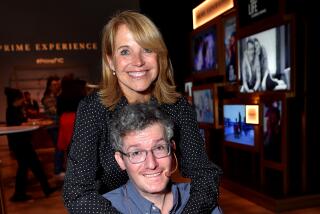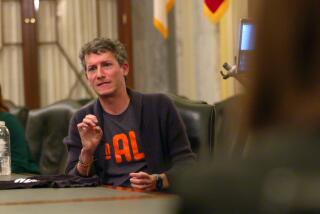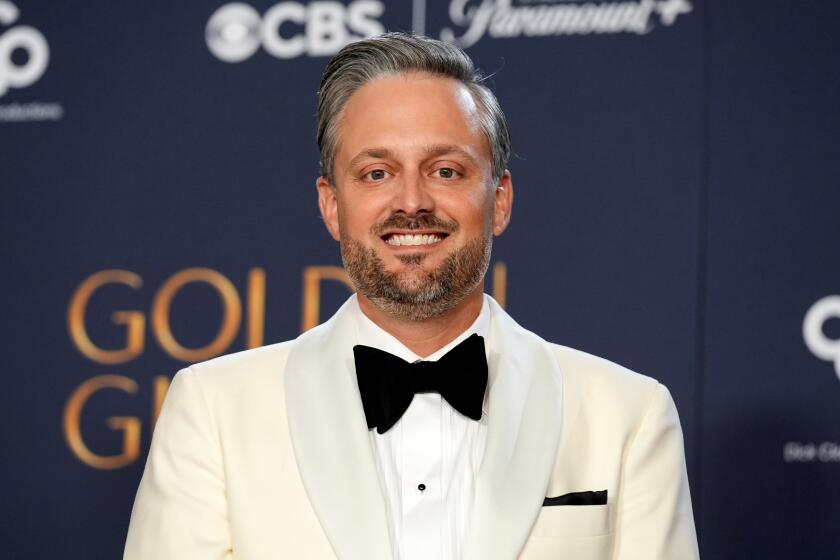Helping to Assure That Life Goes On : Families: Young adults with Down’s syndrome tell producers what they want to see in a TV series that touches their lives.
- Share via
The five young people had sat around the conference table for about an hour, grappling with nine episode ideas for the upcoming third season of ABC’s “Life Goes On.”
They had gone to Warner Bros. in Burbank to assess plot lines for Corky Thacher, the series’ 20-year-old character with Down’s syndrome. It was familiar ground for the volunteer consultants, all of whom have the genetic disorder that causes mental retardation. But they weren’t necessarily in agreement with the producers and directors who had solicited their opinions.
What the young people wanted most was not on the story list. They wanted Corky to have a girlfriend, or at least a date. Either would be good.
The show’s staff looked curious and the conversation perked up.
Suddenly, Chris Clubb, 22, who had been doodling and seemed miles away, asked, “Could he have a love triangle?”
A current passed through the directors. Poised, pens in hand, they waited for Clubb to go into detail.
“One girl could be normal. One could have (Down’s),” he said. “Or one could just be disabled. Maybe in a wheelchair.”
Directors Larry Shaw and Kim Friedman huddled for a few moments, whispering. Shaw looked up and told creator and executive producer Michael Braverman: “We love it. Corky would be put in a position of having to hurt someone, reject someone. That hasn’t happened before.”
The idea wasn’t the first that Clubb and the other consultants--whom producers found through contacts with Down’s syndrome groups--had contributed to “Life Goes On.” Several weeks before this early July session, the young people had met with the writers; some had consulted informally on the series’ pilot.
In fact, as the producers and directors filtered into Stage 15, the conference room came to life, like a family reunion.
When Bill Smitrovich, a director and the actor who plays Corky’s father, Drew Thacher, arrived, consultant Andrea Friedman, 21, flung her arms around him and announced, “Hey, I like this guy.”
“I like you too,” Smitrovich answered, returning her hug.
As the visitors and staff helped themselves to cold cuts and potato salad, one consultant’s mother asked the universal parental question: “Do you want the parents to just get lost for a while?”
She got the inevitable answer, “Yes please,” from a staffer.
And once the parents took off, the consultants candidly revealed their own wistfulness and concerns, particularly about dating and romance.
Willy Montgomery, 16, said he did not have a girlfriend, adding an open-ended “I wish.”
“I don’t know,” mused Nadou Delaat, 22. “I’d just like to have myself a boyfriend. We’d talk, hold hands, things like that. We could go to movies, restaurants. I could see what his hobbies are. Is he talented?”
“They could do everyday things,” said Ethan Kim, 25, referring to the program. “The same things with boyfriends, girlfriends, the same with gay people. But some things are supposed to be private. Holding hands is private.”
Someone mentioned kissing, and the consultants were off, making distinctions in their own experiences between kissing on the cheek, on the lips and French kissing: “Not again, please!” “It’s nice, but sometimes it’s done in a sloppy way.”
For the most part, the consultants exhibited poise and self-confidence. These are tenuous attributes, however, and it is clear that hard work has gone into their social ease. They forget neither their disadvantage nor their differences from the people they call “regular” or “normal.”
* Although it was taking her a while, Friedman had a point to make, and one director kept sidetracking her with his comments.
“Larry,” she warned, looking at him across the table, “I am going to speak.”
* Clubb, who works in maintenance at a Wherehouse record store, told of difficulty in budgeting his money. He was working on it, he said, with his independence trainer.
“He helps me balance my paycheck,” Clubb told supervising producer Bob Goodwin.
Smiling in self-deprecation, Goodwin asked in jest, “Can he help me?”
In a flash, Clubb answered seriously, “You’re not handicapped, sir. You should get a psychiatrist.”
Such exchanges, though, were rare. There were a lot of general questions for the consultants: What was it like when they were picked on? How did they handle stress? What did they do when they were scared or mad?
“We want to make sure,” Smitrovich told them, “that we represent you and your situation as well as we can.”
Montgomery discussed his anger: “Sometimes I cry a bit.”
Delaat said she used to be scared when alone in the house: “Sometimes I act like a baby.” Montgomery used to be scared, too, but now he can handle it. His parents order him a pizza and he pays the delivery person.
Executive producer Braverman told the directors about the consultants’ independence, and said Friedman worked in her father’s law office and had a driver’s license. Some of them ride the public buses by themselves, and others are working with independence trainers to do so. He asked if the others wanted to drive?
Not Ethan Kim.
“You see, driving a car--you’d be like Don Knotts,” Kim said, referring to the comedian known for his “nervous wreck” skits. The speed, the signs, the gas mileage would be too much.
Clubb told of his difficulties counting money: “If I were to buy a notebook for $3 and gave $5, it’s hard for me to figure in my head what to get back. I’ve got to write it. A dime, a quarter, 36 cents, 78 cents. It’s very hard for me.”
Braverman, who consults regularly with several Down’s syndrome organizations and the young people themselves, explained to directors that “people with Down’s process information much slower. They get it, but they get it slower.”
When it came to “Life Goes On,” the consultants wavered between being sophisticated insiders--scanning story lines and pitching ideas--and identifying so closely with the Thacher family that Smitrovich more than once had to remind them that the show is only make-believe.
The consultants had problems with one episode in which Corky accidentally burns down the family restaurant and must confess. The directors wanted to know how they would handle a situation like that, but were met with resistance.
Kim didn’t want Corky “to mess with the stove” and asked what was the matter with Corky’s job coach. He said Corky could avoid the accident by not hurrying: “You have to tell yourself, ‘This is not a marathon. Take your time.’ People with Down’s syndrome have to shift their gears.”
Delaat, who seems to have total recall of the episodes to date, stated the group’s preferences for those moments when Corky comes off well.
“That time he stood up for his sister,” Delaat said. “I thought that was the best part that ever happened.”
Nowhere was their identification with Corky more poignant, though, than when Braverman told the consultants that the show’s parents, Drew and Libby Thacher, would be considering a divorce.
It seemed almost as if he were “breaking the news” about their own parents.
“What?” the two women cried out in unison, clearly shocked.
“They’re going to start arguing,” Braverman explained.
“What are they arguing about?” Friedman wanted to know, retracing the family’s problems during the past season and searching for an explanation. “About the baby or the abortion?”
They wondered openly if perhaps Corky had driven his parents to divorce by burning down their restaurant.
Delaat said the prospect of divorce would scare her.
“Inside, I’d miss the one that moved,” Friedman said. “I want to see him but can’t. I’d feel like he died. I’d be sad. I’d be crushed.”
Clubb looked toward the row of directors and producers for a moment and then, with a sad reproach, counseled them gently against the divorce: “Don’t do that.”
More to Read
The complete guide to home viewing
Get Screen Gab for everything about the TV shows and streaming movies everyone’s talking about.
You may occasionally receive promotional content from the Los Angeles Times.






